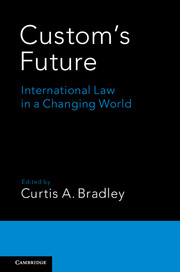Book contents
- Frontmatter
- Dedication
- Contents
- Notes on Contributors
- Introduction: Custom's Future
- 1 Custom's Past
- 2 Customary International Law Adjudication as Common Law Adjudication
- 3 Customary International Law as a Dynamic Process
- 4 Custom, Jus Cogens, and Human Rights
- 5 Customary International Law: How Do Courts Do It?
- 6 Custom's Method and Process: Lessons from Humanitarian Law
- 7 The Growing Obsolescence of Customary International Law
- 8 The Strange Vitality of Custom in the International Protection of Contracts, Property, and Commerce
- 9 The Decline of Customary International Law as a Source of International Criminal Law
- 10 Customary International Law and Public Goods
- 11 Reinvigorating Customary International Law
- 12 The Evolution of Codification: A Principal-Agent Theory of the International Law Commission's Influence
- 13 Custom and Informal International Lawmaking
- 14 Custom's Bright Future: The Continuing Importance of Customary International Law
- Bibliography
- Index
8 - The Strange Vitality of Custom in the International Protection of Contracts, Property, and Commerce
Published online by Cambridge University Press: 05 February 2016
- Frontmatter
- Dedication
- Contents
- Notes on Contributors
- Introduction: Custom's Future
- 1 Custom's Past
- 2 Customary International Law Adjudication as Common Law Adjudication
- 3 Customary International Law as a Dynamic Process
- 4 Custom, Jus Cogens, and Human Rights
- 5 Customary International Law: How Do Courts Do It?
- 6 Custom's Method and Process: Lessons from Humanitarian Law
- 7 The Growing Obsolescence of Customary International Law
- 8 The Strange Vitality of Custom in the International Protection of Contracts, Property, and Commerce
- 9 The Decline of Customary International Law as a Source of International Criminal Law
- 10 Customary International Law and Public Goods
- 11 Reinvigorating Customary International Law
- 12 The Evolution of Codification: A Principal-Agent Theory of the International Law Commission's Influence
- 13 Custom and Informal International Lawmaking
- 14 Custom's Bright Future: The Continuing Importance of Customary International Law
- Bibliography
- Index
Summary
Large parts of the international economic order remain governed by “soft laws,” with the more notable exception of international trade and investment regulation. But because the trade and investment areas have been the result of treaty lawmaking, the role of custom has become concealed under a patchwork of treaty rules. Out of sight, custom is not only out of mind, but its utility is scorned. In other areas, such as the immunity of states from commercial claims, a combination of treaty, custom, and national laws has filled the gap in public international law regulation. By shifting attention from lawmaking to international economic law's “adjudicative aspects,” this chapter intends to, first, defend custom's continued importance in international economic law, particularly in the arbitral interpretation of investment treaty clauses, that is, in the protection of property and contracts. In contrast, custom's potential role in respect of trade-related treaty clauses is still largely unrealized. The chapter proceeds to discuss how questions about foreign sovereign immunity to commercial claims has been the result of minute domestic lawmaking, which in turn fashions detailed customary rules that are fleshed out in even greater detail by domestic courts. These illustrations from the trade, investment, and commercial spheres illustrate some of the ways in which custom continues to be useful, whether or not custom is as fully utilized – as in the trade area – as it should be.
Second, this chapter responds to current criticisms of custom's supposed deficiencies in making new international law, particularly in global economic regulation. It argues, against the grain of the current literature, that (i) custom is at least as susceptible as treaties to detailed customization in design, (ii) like treaties, customary lawmaking can also be formed through complex tradeoffs (and that custom is not simply achieved through “in-kind” reciprocity), and, finally, (iii) custom's lack of predictability is overstated. My contention is that custom is more useful than we might think in making new laws because the same diplomatic, organizational, and institutionalized methods that are used today to make and remake treaty laws also create custom and that these methods address many of the weaknesses that are usually attributed, in the abstract, to customary lawmaking.
- Type
- Chapter
- Information
- Custom's FutureInternational Law in a Changing World, pp. 205 - 229Publisher: Cambridge University PressPrint publication year: 2016

